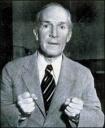hope and shovels
US!
Chris Bachelder
2006
Early in Chris Bachelder’s latest novel, US!, the often-resurrected Upton Sinclair tells his reluctant secretary-cum-protector of an early job writing for the funny pages:
“I will tell you the secret of joke writing,” he said. “Jokes are made up hind end forward, so to speak.”
Beginning with a subject—the great Socialist chooses tramps, in this case, and their distaste for bathing—he comes up with a joke clever enough to amuse the secretary, who is occupied in scanning the road for assassins, and then stumps him with a classic joke from “aught-three”:
Mrs. Jones goes into her grocer’s and asks for a dozen boxes of matches. Says the grocer: “Why Mrs. Jones, you had a dozen boxes of matches yesterday!” Says Mrs Jones, “Oh yes, but you see, my husband is deaf and dumb, and he talks in his sleep!”
“It’s a little mind-puzzle,” Sinclair tells the scared young man, refusing to explain the punch line. Much later, when the answer comes to him, at the same time obvious and impossible, he finds himself once again stepping up to save and follow the stubborn, naive old man in his quixotic cause to bring Socialist utopia to the United States.
Both a political novel and an exploration of the value, if any, of political novels, Bachelder avoids the literary criticisms levied on Sinclair’s own prodigious output—namely a general bludgeoning of characters and plotlines in the service of his political manifesto. Bachelder’s Sinclair, who continually returns to a nation that needs his ideas as much as it violently rejects him, is a tragic would-be hero whose political plans are as hind-end-forward as his jokes. The end of his revolution is clear, and clearly necessary: a society in which citizens are voters and workers rather than consumers and disposable labor, and a government that both regulates big business harshly and provides an adequate safety net for individuals. Sinclair preaches—or tries to preach—the evils of unbridled capitalism and the better life for all under a Socialist system without providing a real-world plan for implementing it. When people are convinced of their own best interest, they’ll rise up. Obvious—and impossible.
In fact, a combination of corporate and government pressure (and hired assassins), along with individuals’ knee-jerk hatred of Communism and love of a celebrity spectacle, prevents Sinclair from speaking in public or publishing his books in anything but small batches. His body carries the semi-healed scars of bullets, knives, even a harpoon. His presence galvanises the opposition, providing them with a figurehead of evil that whips the working-class masses into ill-informed frenzy even as it distracts them from the universality of their setbacks. His continual returns from the dead, which one would expect to generate shock at least, are instead condemned merely as unseemly; it’s his beliefs that are unnatural.
What is Socialism? It is Un-American. It is Communists who want to come into your house and take away your tv, your Cuisinart, the SUV in your driveway, leaving you with lower pay and higher taxes, with less food in your children’s mouths and no hope for their future. It wants to take away your American Dream of success through hard work.
The Socialists, many of whom have a small red shovel tattooed on some hidden bit of skin, meet in secret, drinking hot coffee, to watch a film of Sinclair spontaneously preaching, thinking that it’s bad fiction like the reviewers say, but it’s also their lives, and they are moved. The Anti-Socialist Leagues meet in elementary school cafeterias, drinking coffee and organising volunteers to pick up litter, teach parenting classes, and raise funds for public services. The multiple Sinclair assassins are national heroes, nominally punished with jail terms and easily paroled, celebrated in the corporate-owned media and as individually sponsored as Nascar drivers. The content generated about them is based in their skill and personalities, with glancing references to them protecting American society in some abstract fashion. There is no mention of what place debate has in a free society, or what a society has become when threats and murder are acceptably used to stifle dissenting voices.
The people are too tied up in their own problems—layoffs, uninsured health problems, the growing threat of outsourcing—to consider such abstract concepts, like what this ‘America’ is that needs to be protected at all costs. They’re happy to be distracted by an exciting performance, or a good old-fashioned book burning.
US! doesn’t end particularly happily or hopefully for Upton Sinclair or the United States, as one would expect given the current state of the Murrican Left. There’s a moment of shared plenty and happiness, of community and family wellbeing, in a destructive spectacle. The moment for Sinclair’s peaceful revolution has passed, if indeed it ever existed even in the depths of the Great Depression. The human impulse toward community action is safely tucked into bed with the system that erodes it.
As a political novel, however, perhaps US! can motivate readers where Sinclair’s stridently upbeat endings fail. It’s satire, yes, but it’s my life, and I am moved.
